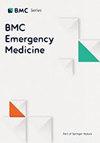院前神经急症--急诊专业人员院前神经评估现状调查
IF 2.3
3区 医学
Q1 EMERGENCY MEDICINE
引用次数: 0
摘要
神经系统急症是急诊医疗服务(EMS)中误诊率最高的主要诊断类别之一。尽管人们知道时间敏感性和院前因素的重要性,但院前延误仍很常见。尽管已开发出多种脑卒中分诊量表,但院前环境中仍缺乏金标准。我们的目的是评估急救人员对神经系统急症的认知,并找出目前在院前处理中风、癫痫发作、非特异性神经系统症状和儿科神经系统急症方面存在的问题、困难和改进机会。该研究通过 SoSci Survey 进行在线调查,调查时间为 2023 年 3 月 1 日至 6 月 30 日,调查对象为所有从事急救医疗服务的人员。访问链接通过滚雪球、社交媒体和宣传海报上的二维码进行分发。调查以匿名方式完成。最终调查包括 30 个德语问题,主题涉及神经系统急症、一般神经系统评估、特定神经系统检查(包括儿科评估、中风和癫痫发作)以及改进建议。最大的参与者群体是护理人员,他们估计遇到神经系统急症的比例一般为 20%-60%。当感到不安时,主要原因是症状不明确和医院收治能力不足。最大的挑战是多种多样的。近 80% 的参与者认为,对于痴呆、醉酒或儿童等困难患者群体,可以省略神经系统评估。75% 的人在进行儿科评估时感到不自在,50% 的人不熟悉儿科格拉斯哥昏迷量表。需要通过更加标准化的实践培训和明确统一的指导方针来提供支持。此外,显然还需要同行合作、反馈和病例共享。数字化、远程医疗的使用以及文件协议的更新版本,包括儿科对现行指南的调整,都能进一步改善院前环境中的神经评估。本文章由计算机程序翻译,如有差异,请以英文原文为准。
Prehospital neurological emergencies– a survey on the state of prehospital neurological assessment by emergency medical professionals
Neurological emergencies are one of the major diagnosis groups in the Emergency Medical Services (EMS) with the highest rate of misdiagnosis. Despite the knowledge of time sensitivity and the importance of prehospital factors, prehospital delay is common. Although several stroke triage scales have been developed, a gold standard in the prehospital setting is lacking. Our aim was to evaluate the perception of neurological emergencies by EMS personnel and to identify current problems, difficulties and opportunities for improvement in the prehospital management of stroke, seizure, non-specific neurological symptoms, and paediatric neurological emergencies. The study was conducted as an online survey through SoSci Survey and was made available from March 1st to June 30th 2023 to all personnel working in emergency medical services. The access link was distributed through snowballing, social media, and through a QR code on a promotional poster. The survey was completed anonymously. The final survey consisted of 30 questions in German on the topics of neurological emergencies, general neurological assessment, specific neurological examination including paediatric assessment, stroke, and seizures, and finally suggestions for improvement. The largest group of participants were paramedics, who estimated to encounter neurological emergencies at a general rate of 20–60%. When unease was felt, the main reasons were ambiguity of symptoms and insufficient admission capacity of hospitals. The biggest challenges were highly varied. Almost 80% of participants assumed that the neurological assessment would be omitted in difficult patient groups such as demented, intoxicated or children. 75% felt uncomfortable making a paediatric assessment, 50% were unfamiliar with the Paediatric Glasgow Coma Scale. Support through more standardized practical training and defined, uniform guidelines is needed. There was also a clear need for peer collaboration, feedback and case sharing. Digitalization, the usage of telemedicine and updated versions of the documentation protocols including paediatric adaptations to current guidelines could further improve current neurological assessment in the prehospital setting.
求助全文
通过发布文献求助,成功后即可免费获取论文全文。
去求助
来源期刊

BMC Emergency Medicine
Medicine-Emergency Medicine
CiteScore
3.50
自引率
8.00%
发文量
178
审稿时长
29 weeks
期刊介绍:
BMC Emergency Medicine is an open access, peer-reviewed journal that considers articles on all urgent and emergency aspects of medicine, in both practice and basic research. In addition, the journal covers aspects of disaster medicine and medicine in special locations, such as conflict areas and military medicine, together with articles concerning healthcare services in the emergency departments.
 求助内容:
求助内容: 应助结果提醒方式:
应助结果提醒方式:


